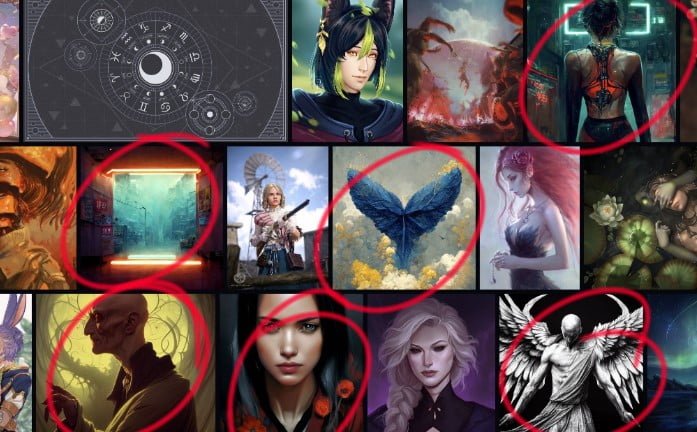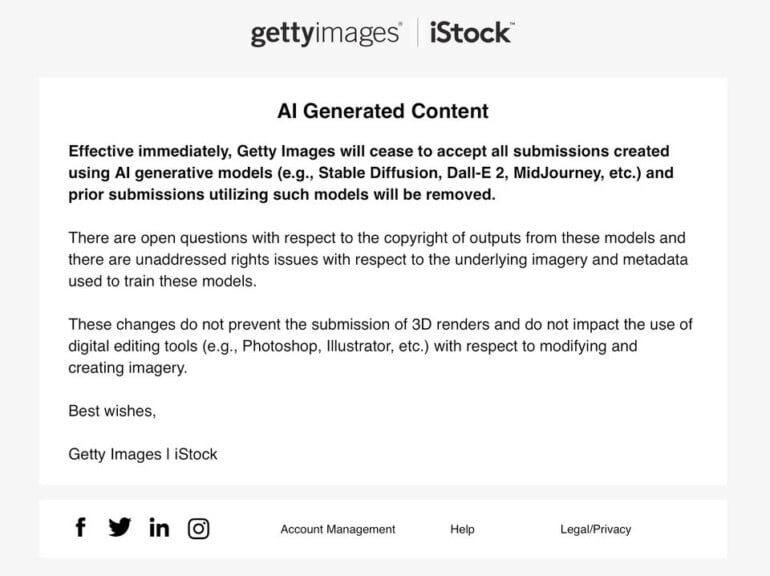Image and art platforms ban AI images from DALL-E 2 and co.

Update September 22, 2022:
With Getty Images, one of the most important online image platforms is positioning itself against AI images. With immediate effect, the platform will no longer accept images generated by artificial intelligence. AI images already included in the picture database will be deleted.
The company justifies this with "open questions" in copyright due to the training data of the models that generate the AI images (see article below).

Original article from September 13, 2022:
First art platforms ban works by AI image generators like DALL-E 2, Midjourney or Stable Diffusion.
Recently, two specific occasions have sparked discussion about the relevance and impact of AI image generators like DALL-E 2 and Midjourney on artists.
First, it was The Atlantic reporter Charlie Warzel, who used an illustrative AI image in a newsletter and was heavily criticized for it on Twitter. An AI painting that was successful in a well-respected U.S. art competition, winning first place in the digital art category, made even bigger waves.
Now there is a new outcry - this time from the camp of art creators.
Art platforms ban AI images
Online image and art platforms Fur Affinity, Newgrounds, and Inkblot have decided to adopt an anti-AI image policy. Fur Affinity justifies this decision by saying that AI image systems create their visuals based on the works of human art creators without asking them.
"Our goal is to support artists and their content. We don’t believe it’s in our community’s best interests to allow AI generated content on the site," the platform operators write.
Newgrounds says it wants to prevent its platform from being flooded with AI images. "We want to keep the focus on art made by people."
The top dogs aren't moving yet
Deviantart and Artstation, two of the largest online art platforms, have not yet taken a position. In their communities, there are calls to speak out against AI images as well - also because the platforms are apparently flooded with them.
https://twitter.com/ZakugaMignon/status/1567280766471512066
Controversially, phrases like "trending on Deviantart" or "trending on Artstation" are also popular additions to text-to-image prompts to get image generators to adopt a high-quality digital art style. The platforms thus involuntarily become part of the AI image generators' offerings.
Fear of devaluation and unresolved copyright issues
At its core, the current controversies surrounding AI art ignite around two points: The first, more important point is the fear of artists that their work will become superfluous or at least devalued.
The flood of images and illustrations on platforms like Deviantart and Artstation supports this thesis. AI systems decouple creativity and skill. The idea suddenly counts more than the craftsmanship. Greg Brockman, the co-founder of OpenAI, the company behind DALL-E 2, predicts that the system will have an impact on the job market for graphic artists and designers.
The question of copyright is also unresolved: the huge AI models of DALL-E, Stable Diffusion and similar systems are trained with hundreds of millions of images of artists from the Internet.
Although the motifs are not copied exactly, they are found proportionately in new works, even if only traces of them remain. The issue of copyright becomes particularly clear when the AI is asked to produce images in the style of a particular artist.
A counter-argument could be that human artists are also inspired by many other works, adopt styles, mix them and develop them further. Whether machine and human inspiration processes are comparable will probably have to be decided by international jurisprudence.
AI News Without the Hype – Curated by Humans
As a THE DECODER subscriber, you get ad-free reading, our weekly AI newsletter, the exclusive "AI Radar" Frontier Report 6× per year, access to comments, and our complete archive.
Subscribe nowAI news without the hype
Curated by humans.
- Over 20 percent launch discount.
- Read without distractions – no Google ads.
- Access to comments and community discussions.
- Weekly AI newsletter.
- 6 times a year: “AI Radar” – deep dives on key AI topics.
- Up to 25 % off on KI Pro online events.
- Access to our full ten-year archive.
- Get the latest AI news from The Decoder.